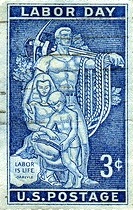 The first Monday every September is Labor Day, and it has been ever since legislation was rushed through Congress in merely six days in 1894. Americans celebrate Labor Day by engaging in the most relaxing pastimes: closing public pools, preparing for football season, putting their white linen pants at the back of the closet, and partaking of a staggering array of grilled meats. The day was initially proposed to celebrate the “strength and esprit de corps of trade and labor organizations” at a time when unions were incredibly powerful. Their power has eroded in the 107 years since Labor Day was declared a national holiday, but I think I can speak for all of us when I thank the gentlemen from the Pullman Strike of 1893 for getting a Federal holiday as a token of reconciliation from President Grover Cleveland and company.
The first Monday every September is Labor Day, and it has been ever since legislation was rushed through Congress in merely six days in 1894. Americans celebrate Labor Day by engaging in the most relaxing pastimes: closing public pools, preparing for football season, putting their white linen pants at the back of the closet, and partaking of a staggering array of grilled meats. The day was initially proposed to celebrate the “strength and esprit de corps of trade and labor organizations” at a time when unions were incredibly powerful. Their power has eroded in the 107 years since Labor Day was declared a national holiday, but I think I can speak for all of us when I thank the gentlemen from the Pullman Strike of 1893 for getting a Federal holiday as a token of reconciliation from President Grover Cleveland and company.
Labor Day 2011 comes at an ironic time, with unemployment at 9.1% and the economy still not recovered from the crisis of 2008, but one need only to look back 70 years to see a Labor Day on the exact opposite end of the spectrum. And thanks to the Arthur B. Church KMBC Radio Collection at UMKC, we cannot just look back, we can listen up.
On September 1, 1941, President Franklin Delano Roosevelt delivered a radio address rife with the emotion of impending war. Less than a month earlier, Roosevelt met with Winston Churchill to draft the Atlantic Charter; within a month, the USS Greer was fired upon by a German submarine and the first Moscow Conference began. A mere three months later, Roosevelt would deliver the most famous speech of his life on “a day which will live in infamy” and war was declared on Japan.
American labor in September 1941 was engaged largely in the task of producing weapons of war despite the United States’ neutrality at the time. Roosevelt speaks to this dichotomy by declaring that “We have never sought glory as a Nation of warriors. We are not interested in aggression. We are not interested—as the dictators are—in looting. We do not covet one square inch of the territory of any other Nation. Our vast effort, and the unity of purpose that inspires that effort, are due solely to our recognition of the fact that our fundamental rights-including the rights of labor—are threatened by Hitler’s violent attempt to rule the world.”
It is endlessly fascinating to view this speech through the lens of the history that we know occurred after it was given. Two things particularly leap to mind. First, Adolf Hitler was an actual living person, a world leader in the middle of an intensely terrifying quest for world dominance. Over the course of time, that fact has been obscured by the invocation of Hitler and Nazism as code words for anything we find disagreeable, but there was a time when Hitler was “current events,” and hearing Roosevelt speak about the need to support the Allies in their efforts against the Nazi regime reminds us of that. Second, it is startling to hear the evolution of the United States as an international power. It took less than twenty years for us to go from Roosevelt’s powerful message of weaponry production as a defense for our fundamental rights to perhaps the greatest presidential farewell address of all-time, Dwight Eisenhower’s profound warning about the ever-expanding military-industrial complex.
You can read this speech online, as you can with lots of great speeches, but it’s really amazing to hear the words spoken.[audio:http://info.umkc.edu/specialcollections/wp-content/uploads/2011/09/2011-09-01_LaborDay_Church.mp3|titles=FDR Labor Day address]Roosevelt was an incredibly gifted speaker, filled with extreme intensity, and the Labor Day 1941 speech is a perfect example of his skills.
Of all the ways to document history, audio is the most captivating. This is an obvious thing when you’re talking about a speech, perhaps, but it holds true for anything. Watch video of the Hindenburg disaster with no sound and it is certainly eye-opening. But it really becomes heartbreaking when you hear Herb Morrison fight back tears and try and put into words what happened. Ditto the Kirk Gibson home run in Game 1 of the 1988 World Series, perhaps the most famous play in baseball history. The story is great, the video is great, but it becomes a transcendent moment when you hear Ernie Harwell’s call of “I don’t believe what I just saw!”
There are a lot of great historical audio recordings to be found in the KMBC collection at UMKC, including a great deal more from President Roosevelt. History comes alive when you hear it, and when I listened to the Labor Day speech I felt connected to a time and a place that I have no real comprehension of. I could practically taste the doctor-recommended Chesterfield brand cigarettes! Roosevelt’s Labor Day speech, and many of the others available, give us an opportunity to be in the moments that our parents and their parents lived.
Happy Labor Day, America!
Erik Klackner, guest contributor
